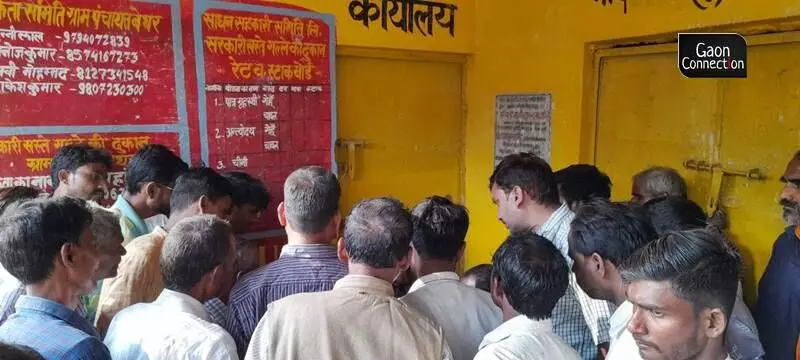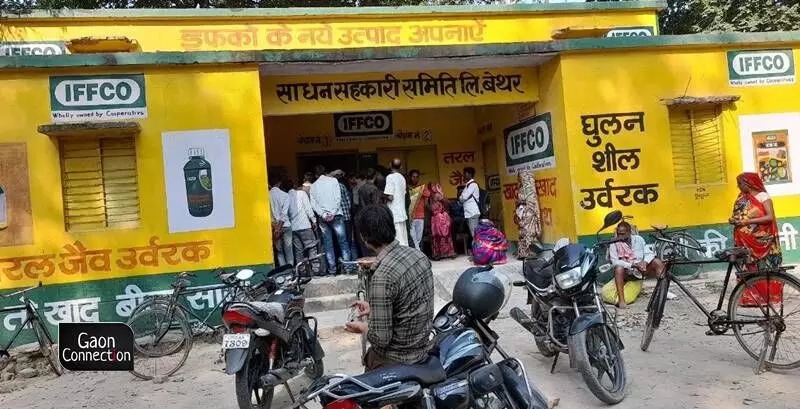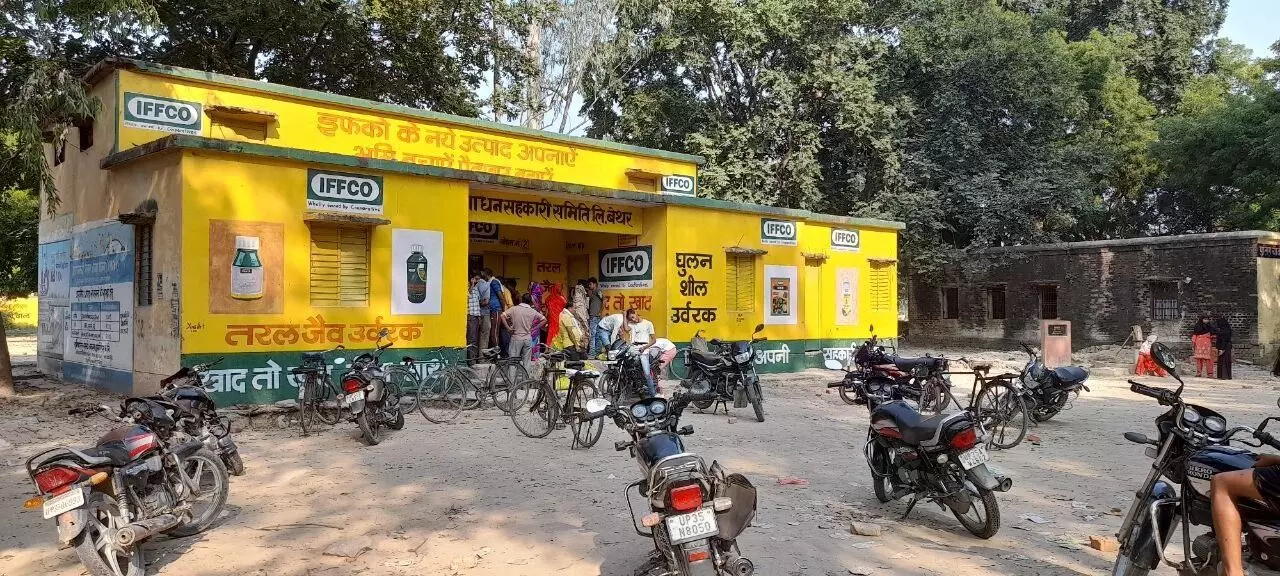Unnao, Uttar Pradesh
Ajay Tripathi has been waiting for two long days in front of the Sadhan Sahkari Samiti (co-operative store) in Bethar village, in Sadar tehsil, Unnao. He is hoping to buy fertilisers for his six bighas (1 bigha = 0.25 hectare) of farm land back home in Koluhagad village, about nine kilometres away.
The 46-year-old farmer who grows mustard and wheat on his land, is not alone as hundreds of farmers like him have been waiting in vain. They reach the co-operative store in the morning, stand all day in a line and return empty handed.
“I have still not sowed anything because I have no fertilisers,” the worried farmer told Gaon Connection.”I brought my son along with me. We are given one sack of fertiliser per Aadhaar card, so with my son’s card, we can take back two sacks of the fertiliser. I actually need eight sacks, but I will take what I am given,” he added.
Farmers in Unnao, Uttar Pradesh, are complaining of a shortage of DAP (di-ammonium phosphate that contains both nitrogen and phosphorus that are essential for plant nutrition) fertiliser, which is a must for sowing rabi season crops such as mustard, potatoes and wheat.
Also Read: The bitter gourd is bringing sweet returns to farmers in Unnao, UP
Kuldeep Mishra, district agriculture officer, Unnao, told Gaon Connection that of the 33,650 metric tonnes requirement of fertilisers in the district, 13,000 metric tonnes have been received. However, he assured there was no shortage.
There is urgency in procuring and using the fertiliser as soon as possible in the soil that is still moist. If the moisture content reduces, the land has to be watered once again increasing expenses for the farmer, besides delaying the sowing, complain the farmers who are queuing up at the co-operative stores to buy fertiliser.

There is urgency in procuring and using the fertiliser as soon as possible in the soil that is still moist.
“The fertiliser costs Rs 1,350 per sack (45 kgs) at the government co-operative store, but outside it could cost anything up to Rs 1,550,” Tripathi pointed out. “I also ply an auto rickshaw to make ends meet but have not been able to do so because I have to come here for fertilisers,” he lamented.
Jata Shankar Yadav has also been waiting for two days along with his son. “My son is missing school. I need at least four bags of fertiliser but I will only get one per Aadhaar card, I know,” he told Gaon Connection. Yadav had come there from Pachodda village about eight kilometres away.
The 45-year-old farmer, who also doubles up as an LIC agent, grows wheat in his eight bighas of land. “I know I have to buy the rest from private shops that charge way more and the quality is also suspect,” he added.
Also Read: Kisan Samruddhi Kendra: A one-stop solution which seeks to make farming hassle-free
Waiting at co-operative shops is proving to be expensive for farmers. Most of them have had to leave their work and wait indefinitely and they all know that they will get barely a sack or two of fertilisers and will have to pay up a lot more to get more from private organisations.

They reach the co-operative store in the morning, stand all day in a line and return empty handed.
“I have been waiting here since morning, and I am still not sure if I will get any fertilisers,” Rekha Devi from Nibai village, told Gaon Connection. She had hired an auto rickshaw to drive her there for which she had to pay a fare. Her husband had taken the livestock to graze and that was the reason she was waiting in line, the 50-year-old said. Rekha Devi and her husband own six bighas of land and their requirement is for ideally nine sacks of fertilisers.
“We are poor and we cannot afford to buy fertilisers from private shops. But, if we don’t sow our next crop, what will we feed our family,” she said.
Ravindra Kumar Tiwari from Kulha Gada village had a similar complaint. “I went to the IFFCO (Indian Farmers Fertiliser Cooperative Limited) store in Lohcha, fifteen kilometres away from my village, and found more than 500 people waiting in line, and so I returned home. And, today, here I have been waiting since morning,” he told Gaon Connection.
The 45-year-old farmer said that he was asked to get a printout of his land papers, then asked to furnish his Aadhaar card. “With one bag of fertiliser being given per Aadhaar card, how is it sufficient for any farmer,” exclaimed an exasperated Tiwari. According to him, this year was no different from last year when the same thing happened.
‘We’re helpless,’ say co-operatives distributors
The co-operative officials say they are helpless. “We received 500 sacks of DAP for the rabi season,” Narendra Mishra, the director of the Sadhan Sahkari Samiti, Bethar, told Gaon Connection. “We are distributing one sack per Aadhaar card,” he added.
It is imperative that the farmers spray the DAP fertilisers before sowing their crops, said Dheeraj Tiwari, agricultural scientist from the Krishi Vigyan Kendra, Dhaura in Unnao, told Gaon Connection. “DAP provides phosphorus and nitrogen that are essential nutrients for plant health and help crops such as mustard and wheat grow better and keep them healthy till they are harvested,” Tiwari said.
The district manager of IFFCO, Manvendra Singh told Gaon Connection that that there was a requirement of 9,750 metric tonnes of DAP and 1,058 metric tonnes of NPK (another essential fertiliser that is a combination of nitrogen, phosphorus and potassium) for the rabi crops.
According to him, on October 22, the company received a consignment of 2,640 tonnes of fertilisers which were distributed to the various committees for distribution to the farmers. “We are expecting another 3,400 tonnes and once we get that the committees will have more fertilisers to distribute,” he added.

Farmers in Unnao are complaining of a shortage of DAP (di-ammonium phosphate that contains both nitrogen and phosphorus that are essential for plant nutrition) fertiliser, which is a must for sowing rabi season crops such as mustard, potatoes and wheat.
“There are 151 active committees in the district that are distributing the fertilisers. But snags in the EPOS machines (that are used to validate biometric identification before distribution of goods to people) have delayed distribution. This is the reason why there are such long queues in front of the shops,” Manavendra Singh explained. .
But with fertiliser in limited supply, farmers said that they will have to buy the rest from stores in the open market that cost a lot more than what is available in the government co-operative store, and are always not of good quality.
For instance, Ravindra Kumar Tiwari from Kulha Gada village has already bought 10 sacks of fertilisers from a private shop at Rs 1,500 a sack. “I farm mustard and wheat on 20 bighas of land and I need at least 18 sacks. But, I know I will never get that much here,” the 45-year-old farmer told Gaon Connection in frustration.
Also Read: Kashmiri farmers move from paddy fields to apple orchards for higher returns
‘No shortage,’ claim officials
“There is no shortage and there is enough fertiliser for the farmers for the rabi season. Because of the delayed rains, the sowing of the crops have all begun at the same time and hence the excess demand,” Kuldeep Mishra, district agriculture officer, Unnao, said.
“Only 10 per cent of wheat sowing has begun in the district. Ninety five per cent of the farmers in the district are small marginal farmers and they need no more than two to three sacks of fertilisers, and they will get that,” he added. He also said that they were expecting more fertilisers to arrive and that would take care of the requirement of all the farmers.
Meanwhile, the queues of farmers standing in front of government co-operative stores grow longer. In some places in the district, the stores remain locked with no sign of any sales. And at the end of the day, the number of disheartened, despairing farmers return home empty handed, hoping the following day will bring better news and they will get their quota of fertilisers.
Otherwise, they will have to spend money they can ill afford and buy overpriced fertilisers from private organisations.




















